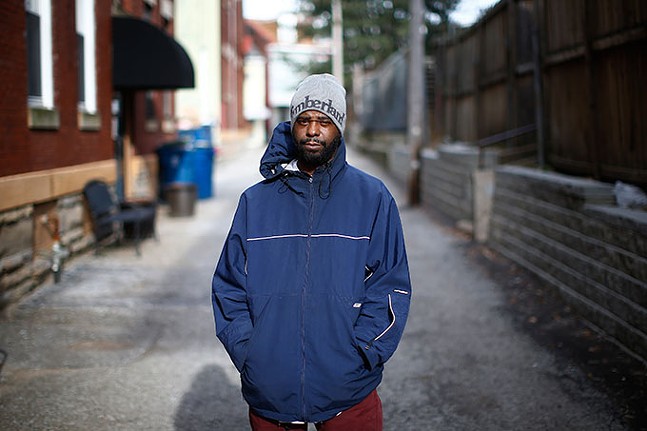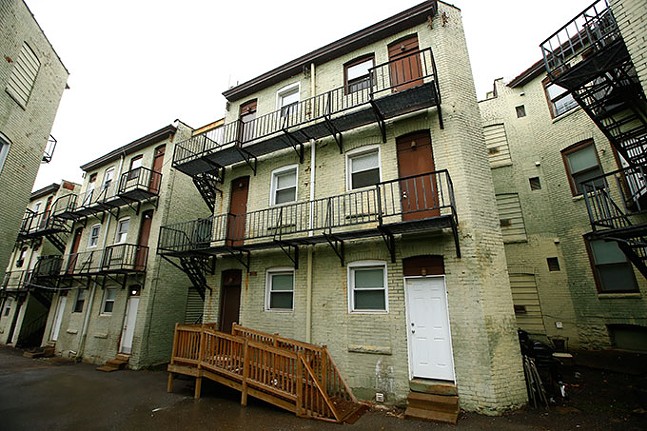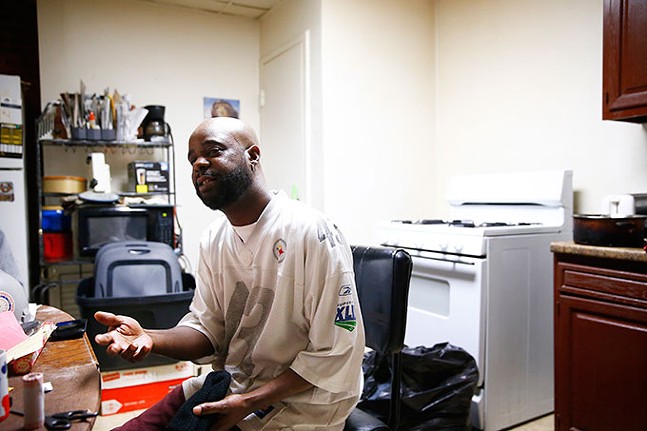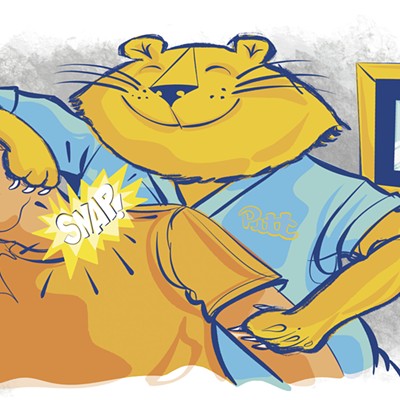Anthony Hardison has lived in his Lawrenceville apartment for more than 10 years. He’s had his ups and downs, but 1 St. Johns Place, Apt. No. 2 has been the home that has provided him some much needed stability.
But at the end of this month, his housing situation is going to be a lot shakier. In December 2019, Hardison received a letter from his property manager that the building owners planned to renovate his unit, so he would have to move out by January 31.
Hardison’s life hasn’t worked out exactly as he envisioned. After high school, Hardison enrolled in the operational engineers training program and found work at the Edgar Thomson Works in Braddock and at construction sites like the Pittsburgh International Airport. It was his dream job. But just before his 21st birthday, he was hit by a car while crossing the street, fracturing several bones and severely damaging his left shoulder. He couldn’t operate heavy machinery anymore, let alone function on a construction site. He says his doctor told him he shouldn’t be lifting anything over 25 pounds because of his injury, even after completing several surgeries.
Over the years, Hardison, 49, found work at Pittsburgh city recreation centers, as a sports coach, and for PNC Bank. But that work was less steady and paid much less than his salary as an operational engineer. Hardison bounced around the region for years, living in Verona, Wilkinsburg, and other parts of Pittsburgh’s East End.
Eventually he got on Section 8, a housing voucher program for low-income residents. His mother had lived at Liberty Point Apartments, the parcel in Lawrenceville that houses St. Johns Place and two other large apartment buildings. In 2010, he was fortunate to find a place there that accepted his housing voucher, in a neighborhood with good public transit and quick and easy access to Downtown, where he takes classes at the Office of Vocational Rehabilitation. Hardison is still hopeful he can rejoin the operational engineers with the right training.
But with his desired housing situation ending, Hardison isn’t exactly sure what his future holds. He hasn’t yet found another apartment that will accept his Section 8 voucher, or one that would match his current $800 rent.
“I appreciate that my landlord rented me, but I don’t understand why they do this to tenants,” says Hardison. “It is just mind boggling. I have been here 10 years. I don’t know why they are doing this.”
Unfortunately for low-income residents in Lawrenceville, Hardison’s story is hardly unique. The neighborhood has been besieged by home flippers, which generally refers to when people or companies buy more run-down homes, add amenities, rehab the properties relatively quickly, and then sell them for much higher than originally purchased. And the housing market is red-hot. It’s not just home sales increasing dramatically; rental prices are also skyrocketing, and fewer and fewer landlords are accepting Section 8 vouchers.
Measures and initiatives were recently passed to help ensure Lawrenceville maintains affordable homes for low-income residents, but it’s easy for developers and flippers to find loopholes, and most of what they are doing is perfectly legal. As homes in Lawrenceville flip over one by one, tenants like Hardison may soon become a relic of the past.
Hardison knows Lawrenceville well. He was born in Johnstown and moved to Pittsburgh as a child, where he attended Arsenal Middle School in Lawrenceville and spent his formative years in Garfield. He is used to being in this part of town. But now it's looking less likely that he'll be able to stay in the neighborhood.
Hardison says his original lease was up at the end of February 2020, but last month, representatives from the property management company that manages Liberty Point Apartments, Aishel Realty, knocked on his door and requested he sign a form. Shortly after, he received a lease-termination notice that required him to vacate the unit by the end of January because of a “planned renovation of the unit.”
He expected any new lease requests to be mailed to him, so he would have time to review it before making a decision. Hardison says he felt pressured to sign a change in his lease because representatives were standing at his door. He also says he didn’t receive a letter detailing his new lease until a week before Christmas, even though it was dated December 11.
Aishel Realty didn’t respond to multiple requests for comment for this story.
Hardison has met with other apartment buildings in the area, notably the new building across from Arsenal Middle School, but the rental prices for a one-bedroom unit are way out of his budget.
“It is definitely difficult, the area has definitely changed,” says Hardison. “Everyone has to be an engineer to afford rent. You have to be a doctor. A lot of people that work at places like FedEx or McDonald’s, there is no way [they] can afford the housing.”
According to RentCafe, the average rent of units listed for Lawrenceville in November 2019 was $1,438. Hardison paid $800 a month for his unit in Liberty Point. (Section 8 vouchers maintain that tenants pay one-third of their income in rent.)
Ernie Hogan of local policy group Pittsburgh Community Redevelopment Group told Pittsburgh City Paper last year that Lower Lawrenceville has experienced “clear gentrification.” Gentrification is when redevelopment brings in more affluent residents, typically at the cost of displacing low-income people.
According to a study from the National Community Reinvestment Coalition, Lower Lawrenceville, where Liberty Point is located, saw its residents’ average incomes increase by 25 percent, its college attainment double to 30 percent of residents, and its average home values increase by 126 percent to $133,600, between 2000-2013. And home prices have increased exponentially since 2013, with many homes in the neighborhood selling for more than $400,000. The neighborhood has always been majority white, but both Central and Lower Lawrenceville have lost hundreds of Black residents over the years.
Hardison has spent the last few weeks trying to box up his things. His apartment is modest, with an old stove and furnace that squeaks loudly every time it comes on. The unit isn’t flashy, but far from run-down. Hardison is a big sports fan, with posters of the Steelers, Pirates, and Penguins adorning the wall of his living room. He recently sold a turntable to a friend for some cash.
He doesn't want to complain too much about his situation, worried other landlords might blackball him, but knows he needs to do something to help him find a new place to live.
“Sometimes when tenants like me complain, they consider me ‘undesirable’ and because of nothing that I did,” says Hardison. “I am concerned about my health. That is all I can speak about. I don’t want to be mad at them. I am only fighting for my rights. But they are forcing me out. They are doing this to a lot of people.”
Aishel didn’t respond to questions about Hardison’s record as a tenant. In 2015, Aishel took him to magistrate court for back rent and the judge ordered him to pay $600. Nothing in Hardison’s lease-termination notice mentions any tenant violations on the part of Hardison, and Aishel offered to be a landlord reference for Hardison in the notice.
In 2017, Aishel came under fire when 140 units it managed throughout the East End were kept in deplorable conditions, resulting in the buildings losing federal subsidies.
Lawrenceville has the fastest growing real estate prices of any neighborhood in the city. This has been going on for the last several years, with rents rising and some prices pushing $700,000 for rowhomes. The neighborhood is arguably the most gentrified in the city, and what was once known as a working-class enclave is now known for its lively restaurant scene, hip bars, and trendy boutiques.
But for a while, Liberty Avenue on the edge of the neighborhood had avoided that. The only restaurant in that corridor is the long-standing Church Brew Works. The row homes along the corridor are older, but now run down. Liberty Point is located on the very far-edge of Lawrenceville, close to the Herron Avenue busway station, but far from the amenities on Butler Street.
The last four years have seen dramatic changes for this part of the neighborhood. The section of Lawrenceville from 36th to 40th and in between Penn and Liberty avenues saw at least 25 homes flip in the last four years, which was about half of the home sales that Pittsburgh City Paper counted in the area. And more than 20 of the recent sales that haven't flipped are owned by real estate firms that specialize in flipping and rehabbing homes.
According to ATTOM Data Solutions, about 7% of home sales in the U.S. over the last few years were flipped homes. Proponents of house flipping say it’s necessary to update an old housing stock, and to bring more houses onto the market. But affordable housing organizations decry its role in increasing gentrification.
Groups like Lawrenceville United are fighting hard for housing policy that will help low-income residents stay in the neighborhood and push back against gentrification. The group backed a successful push for inclusionary zoning in Lawrenceville, which will require large projects to reserve a percentage of their units for households at or below 50% of the Area Median Income (AMI). In 2017, Lawrenceville became home to a Community Land Trust, where nonprofit Lawrenceville Corporation sold seven homes to low-income homebuyers and the homes stay affordable in perpetuity.
While these measures are positive steps, Lawrenceville United director Dave Breingan says widespread displacement of low-income residents is still happening. He says large scale evictions haven't really occurred, but instead scores of individual homes and units have been flipped one at a time.
“The story of displacement in Lawrenceville is tragic and still undertold in my opinion,” says Breingan. “The way it happens is individual properties or smaller portfolios like the ones we've talked about … not where hundreds of residents are displaced all at once. Sometimes that obscures the cumulative impact, which is probably just as dramatic, if not worse.”
And since these flips aren’t technically part of one large project, developers don’t have to comply with the neighborhood's new inclusionary zoning rule, which only requires projects of more than 20 units to ensure 10% affordability.
To combat this death-by-a-thousand-cuts displacement problem, Breingan says Lawrenceville United and Lawrenceville Corporation teamed up in 2018 and explored the possibility of purchasing more than 30 homes, some that were previously rented by Section 8 tenants, to add to the Community Land Trust. However, Breingan says the seller “wanted too high a price to make it work,” and the homes were lost to the private market.
Section 8 tenants like Hardison face a shrinking supply pool in Pittsburgh neighborhoods because landlords don’t like renting to voucher holders and, in neighborhoods like Lawrenceville, they can sell their previously affordable properties to flippers for large profits. According to a Pittsburgh Post-Gazette investigation from 2017, Lawrenceville lost 120 Section 8 units between 2011-2016, including 30 in Lower Lawrenceville.
Last year, the Pittsburgh Housing Authority altered its policy and now further incentivizes landlords to rent to Section 8 tenants in Lower Lawrenceville. But the lure of profits from flipping homes or units may be too powerful. In the third quarter of last year, Pittsburgh house flippers made one of the highest profit margins of any metro area in the country, netting $87,000 in average gross profit and a 136% return on investment, according to ATTOM.
But through all this, Hardison remains optimistic. He knows it will be difficult to stay in Lawrenceville, but he’s hopeful he can complete retraining to join the operational engineers again, believing that improvements in technology means he can do the work, even with his bad shoulder.
If he can become an operational engineer again, he thinks he might be able to afford the neighborhood.

















